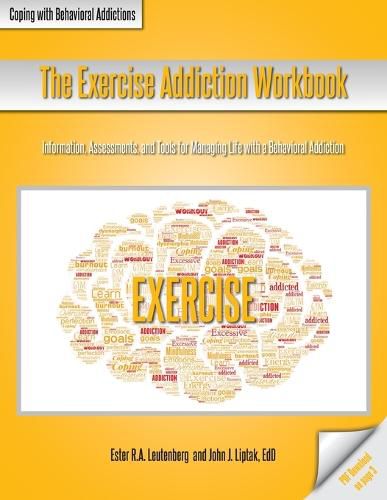Readings Newsletter
Become a Readings Member to make your shopping experience even easier.
Sign in or sign up for free!
You’re not far away from qualifying for FREE standard shipping within Australia
You’ve qualified for FREE standard shipping within Australia
The cart is loading…






This title is printed to order. This book may have been self-published. If so, we cannot guarantee the quality of the content. In the main most books will have gone through the editing process however some may not. We therefore suggest that you be aware of this before ordering this book. If in doubt check either the author or publisher’s details as we are unable to accept any returns unless they are faulty. Please contact us if you have any questions.
Exercise is excellent for everyone! However, it can be dangerous to one's health and well-being when it becomes an obsession. Some people are consumed with physical fitness and exercise. They display some or all the traits below, like those addicted to food, gambling, gaming, love and relationships, risky behavior, sex, shopping, technology, work, and substances.
TRAITS
Obsession.
Inability to cut back or stop.
Dishonesty about the amount of exercise.
Perseverance despite problems in personal relationships.
Continuation of the behavior despite knowing it is way too much.
Constant engagement in the behavior even though it may be causing physical harm.
Exercise causes the release of certain chemicals in the nervous system that create a sense of pleasure or reward. Because of this reaction, people become addicted to the pleasure response they gain from exercising. They then go to extreme lengths to duplicate the pleasure response from
exercising.
People who feel extreme pressure to stay in shape, both self-imposed and from external sources, are at risk of developing an addiction to exercise. People who are overweight and set out on an extreme weight loss regimen may also be at risk of exercise addiction. Part of the problem arises because exercise addiction is not easy to diagnose. Most people addicted to exercise do not see anything wrong with their behavior. They believe they are doing something to take care of themselves. The constant preoccupation
with exercising and working out can be a behavioral addiction that can be effectively treated using a range of cognitive and behavioral therapies.
$9.00 standard shipping within Australia
FREE standard shipping within Australia for orders over $100.00
Express & International shipping calculated at checkout
This title is printed to order. This book may have been self-published. If so, we cannot guarantee the quality of the content. In the main most books will have gone through the editing process however some may not. We therefore suggest that you be aware of this before ordering this book. If in doubt check either the author or publisher’s details as we are unable to accept any returns unless they are faulty. Please contact us if you have any questions.
Exercise is excellent for everyone! However, it can be dangerous to one's health and well-being when it becomes an obsession. Some people are consumed with physical fitness and exercise. They display some or all the traits below, like those addicted to food, gambling, gaming, love and relationships, risky behavior, sex, shopping, technology, work, and substances.
TRAITS
Obsession.
Inability to cut back or stop.
Dishonesty about the amount of exercise.
Perseverance despite problems in personal relationships.
Continuation of the behavior despite knowing it is way too much.
Constant engagement in the behavior even though it may be causing physical harm.
Exercise causes the release of certain chemicals in the nervous system that create a sense of pleasure or reward. Because of this reaction, people become addicted to the pleasure response they gain from exercising. They then go to extreme lengths to duplicate the pleasure response from
exercising.
People who feel extreme pressure to stay in shape, both self-imposed and from external sources, are at risk of developing an addiction to exercise. People who are overweight and set out on an extreme weight loss regimen may also be at risk of exercise addiction. Part of the problem arises because exercise addiction is not easy to diagnose. Most people addicted to exercise do not see anything wrong with their behavior. They believe they are doing something to take care of themselves. The constant preoccupation
with exercising and working out can be a behavioral addiction that can be effectively treated using a range of cognitive and behavioral therapies.